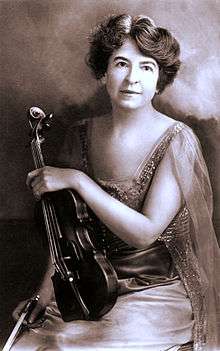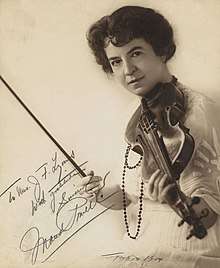Maud Powell
Minnie "Maud" Powell (August 22, 1867 – January 8, 1920) was an American violinist who gained international acclaim for her skill and virtuosity.[1]
Maud Powell | |
|---|---|
 Powell circa 1919 | |
| Born | August 22, 1867 |
| Died | January 8, 1920 (aged 52) |
| Parent(s) | William Bramwell Powell and Wilhelmina Bengelstraeter |
| Relatives | John Wesley Powell, uncle |

Biography
Powell was born in Peru, Illinois. She was the first American violinist to achieve international rank. In 1986, Powell's biographer Karen A. Shaffer founded the Maud Powell Society for Music and Education to further knowledge of Powell and her significant role in music both in the United States and abroad.
Her mother was Wilhelmina "Minnie"[2] Bengelstraeter Powell, and her father was William Bramwell Powell. W.B. Powell wrote numerous books[3] such as The Normal Course of Reading[4] and served as superintendent of Peru Elementary School District 124 from 1862 to 1870. She was the niece of John Wesley Powell, an American Civil War hero and famed explorer of the Grand Canyon. He made his first scientific exploration of the Colorado River in 1869, when Maud was two years old.[2]
Around the age of 7, she began violin and piano lessons in Aurora, located in Kane County, Illinois, a western suburb of Chicago.[5] She was soon recognized as a prodigy and at age 9 began four years of being taken to Chicago for piano study with Agnes Ingersoll and violin study with William Lewis.[6] When she was 13, her parents sold the family home to raise funds to continue her musical education. With her father remaining behind in rented rooms, she traveled with her mother and younger brother William to Europe.[5][6] There she studied under Henry Schradieck at the Leipzig Conservatoire, Charles Dancla at the Paris Conservatoire (after placing first in the entrance exam), and Joseph Joachim at the Berlin Hochschule, among others.[5][7] In 1885 she played Bruch's G minor concerto in her debut with the Berlin Philharmonic under Joachim's baton,[5] and again with the New York Philharmonic under Theodore Thomas after she returned to the United States.[2][6]
She premiered violin concertos by Tchaikovsky and Sibelius in the United States, and performed Dvořák's Violin Concerto on April 7, 1894, with the New York Philharmonic under the baton of Anton Seidl in Carnegie Hall under the supervision of the composer. Powell was a powerful advocate for music by Americans, women, and black composers, including the British composer Samuel Coleridge-Taylor, from whom she commissioned a violin concerto. Powell was a committed champion of the Sibelius Violin Concerto and played it into the repertoire.
In January 1894, she was initiated honorably into musical women's fraternity Alpha Chi Omega.[8]
On October 31, 1916, she performed in Ottawa, Illinois, on the occasion of the dedication of the Ottawa High School building.
On November 27, 1919 in St. Louis, Missouri, she collapsed on stage of a heart attack.[9] [10] On January 8, 1920 she died after another heart attack in Uniontown, Pennsylvania while on tour.[6]
Legacy
Powell was among the first instrumentalists to make Red Seal records for the Victor Talking Machine Company, starting in 1904 until 1919. With these recordings she set an enduring standard for violin performance.[7]
In 2007, American violinist Rachel Barton Pine released a CD of music transcribed by, commissioned by or dedicated to Maud Powell.[10]
In 2009, Maud Powell Favorites, a 4-volume set of Powell's transcriptions and works commissioned by her or dedicated to her was published by the Maud Powell Society for Music and Education. The music was compiled by Karen A. Shaffer who wrote the extensive historical introduction and annotations while Rachel Barton Pine served as the music editor.[11][12]
Maud Powell was posthumously granted the GRAMMY Lifetime Achievement Award on January 25, 2014 at the Recording Academy's 2014 Special Merit Awards Ceremony & Nominees Reception. The award was accepted on behalf of Powell by biographer Karen A. Shaffer and Rachel Barton Pine.[13]
Recordings
- American Virtuosa: Tribute to Maud Powell. Rachel Barton Pine (violin), Matthew Hagle (piano). Cedille Records, 2006: CDR 90000 097[10]
- Powell, Maud: Complete Recordings, Vol. 1 (1904-1917). Naxos Records, 2001: 8.110961[14]
- Powell, Maud: Complete Recordings, Vol. 2 (1904-1917). Naxos Records, 2001: 8.110962[15]
- Powell, Maud: Complete Recordings, Vol. 3 (1904-1917). Naxos Records, 2001: 8.110963[16]
- Powell, Maud: Complete Recordings, Vol. 4 (1904-1917). Naxos Records, 2004: 8.110993[17]
See also
- The Maud Powell Signature, Women in Music, an online music periodical
References
- "Maud Powell, The Violinist, Is Dead. One of Greatest Native Musicians Suffers Nervous Breakdown at 51 [sic] Years. Displayed Gift As Child. Won Her First American Triumph In 1885 After Study Under European Masters" (PDF). New York Times. January 9, 1920. Retrieved 2014-01-09.
Maud Powell, the violinist, died in a hotel here today. She suffered a nervous breakdown yesterday and became so ill that her concert last night was canceled. On Thanksgiving night she collapsed on the stage during her concert in St. Louis. For twenty-four hours she was said to be dangerously ill, but she recovered and continued her tour. The illness was reported as acute gastritis at that time. ...
- Shaffer, K. A. (2004). "Life & Career Timeline". The Maud Powell Society. Retrieved 2014-02-04.
- "inauthor:William inauthor:Bramwell inauthor:Powell - Google Search". www.google.com. Retrieved Aug 3, 2020.
- Search Google Books for The Normal Course of Reading by Powell
- Shaffer, K. A. (2013-12-20). "A lifetime of achievements: pioneering American violinist Maud Powell". The Strad. Archived from the original on 2014-02-22. Retrieved 2014-02-04.
- Furry, W. (July–August 2004). "The pearl of Peru". Illinois Heritage. Illinois State Historical Society. 7 (4): 18. Retrieved 2014-01-28.
- Shaffer, K. A. (1995). "Maud Powell, a Pioneer's Legacy". The Maud Powell Signature, Women in Music. The Maud Powell Society. Retrieved 2014-01-28.
- "Alpha Chi Omega Digital History". alphachiomega.historyit.com. Retrieved Aug 3, 2020.
- "Maude Powell Better" (PDF). New York Times. November 29, 1919. Retrieved 2015-06-08.
- Shaffer, Karen A. "Liner Notes Essay for American Virtuosa: Tribute to Maud Powell". Rachel Barton Pine discography. Archived from the original on 2013-10-04. Retrieved 2010-06-02.
- "Maud Powell Favorites". Maud Powell Society web site. The Maud Powell Society for Women in Music. 2009. Retrieved 2010-06-02.
- Niles, Laurie (2010-05-10). "Rachel Barton Pine's Maud Powell Favorites". Violinist.com blogs. Retrieved 2010-06-02.
- GRAMMY.com. "Lifetime Achievement Award: Maud Powell". GRAMMY News. GRAMMY.com. Retrieved 28 January 2014.
- Shaffer, Karen A. "Liner Notes Essay for Powell, Maud: Complete Recordings, Vol. 1". Naxos. Retrieved 2014-02-05.
- Shaffer, K. A. "Liner Notes Essay for Powell, Maud: Complete Recordings, Vol. 2". Naxos. Retrieved 2014-02-05.
- Shaffer, K. A. "Liner Notes Essay for Powell, Maud: Complete Recordings, Vol. 3". Naxos. Retrieved 2014-02-05.
- Shaffer, K. A. "Liner Notes Essay for Powell, Maud: Complete Recordings, Vol. 4". Naxos. Retrieved 2014-02-05.
External links
| Archives at | ||||
|---|---|---|---|---|
|
||||
| Using archival material | ||||
|
Help:Archival material Finding aids |
| Wikimedia Commons has media related to Maud Powell. |
- Maud Powell biography
- Maud Powell society
- Musical Festival dedicated to Maud Powell
- Discography of Maud Powell on Victor Records from the Encyclopedic Discography of Victor Recordings (EDVR)
- Recordings of Maud Powell on the Library of Congress Jukebox
- Karen A. Shaffer; Neva Garner Greenwood (1988). Maud Powell: Pioneer American Violinist. Maud Powell Foundation. ISBN 978-0-8138-0989-2. OCLC 16801428.
- Maud Powell, Chicago Symphony Orchestra: 125 Moments